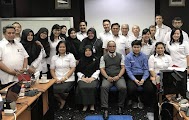SIX SIGMA FOUNDATION
Syllabus
Class Type : Workshop
Duration : 2 Days
(09.00 – 16.00)
Venue & Price : Click Here ,
Registration : Click Here (Save up to 20% for Early Bird Registration !)
What is ?
Six Sigma (6σ) is a
set of techniques and tools for process improvement. It was introduced by
engineer Bill Smith while working at Motorola in 1986. Jack Welch made it
central to his business strategy at General Electric in 1995.
It seeks to improve
the quality of the output of a process by identifying and removing the causes
of defects and minimizing variability in manufacturing and business processes.
It uses a set of quality management methods, mainly empirical, statistical
methods, and creates a special infrastructure of people within the organization
who are experts in these methods. Each Six Sigma project carried out within an
organization follows a defined sequence of steps and has specific value
targets, for example: reduce process cycle time, reduce pollution, reduce
costs, increase customer satisfaction, and increase profits.
The term Six Sigma
(capitalized because it was written that way when registered as a Motorola
trademark on December 28, 1993) originated from terminology associated with
statistical modeling of manufacturing processes. The maturity of a
manufacturing process can be described by a sigma rating indicating its yield
or the percentage of defect-free products it creates. A six sigma process is
one in which 99.99966% of all opportunities to produce some feature of a part
are statistically expected to be free of defects (3.4 defective features per
million opportunities). Motorola set a goal of "six sigma" for all of
its manufacturing operations, and this goal became a by-word for the management
and engineering practices used to achieve it
Training Description :
Learn how to apply Six Sigma to drive improvements in the
performance of your processes, products, and services. Trainer will explains
the fundamentals of Six Sigma—a customer-focused, data-driven approach to
improvement. Trainer will go over the basic concepts, including
critical-to-quality (CTQ) requirements, variation, defects per million
opportunities (DPMO), the roles and
belts of Six Sigma professionals, and the criteria for identifying Six Sigma
projects successfully. The rest of the course walks through the five phases of
Six Sigma DMAIC—Define, Measure, Analyze, Improve, and Control—and the steps, data,
and key deliverables involved in each phase.
Topics include:
- · What is Six Sigma?
- · Understanding key concepts such as Y = f(x) and sigma level
- · Selecting Six Sigma projects and team members
- · Planning in the Define phase
- · Gathering data in the Measure phase
- · Analyzing data in the Analyze phase
- · Selecting and evaluating solutions in the Improve phase
- · Developing a control plan in the Control phase
Participants
: Manager, Senior Manager, Executive, CEO
Speaker :
Purnama Academy Trainer
#triningsixsigma #greenbeltsixsigma
#silabus #pelatihan #jakarta #bandung #bali #jadwaltraining
































0 comments:
Post a Comment
Terima kasih telah mengunjungi halaman website kami, Jika ada pertanyaan terkait informasi di Atas silahkan isi Comment Box di bawah ini, Tim kami akan merespon komentar/ pertanyaan Anda paling lambat 2 x 24 Jam
Untuk respon cepat silahkan hubungi 0838-0838-0001 (Call/Whatsapp)
Regards,
Management,
www.purnamaacademy.com